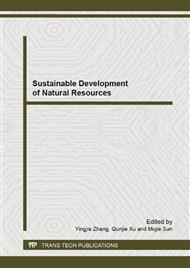p.1553
p.1557
p.1563
p.1568
p.1573
p.1578
p.1585
p.1591
p.1597
The Decision-Making for Large-Scale Carbon Capture and Storage Projects in China and the U.S
Abstract:
Carbon capture and storage (CCS) can be an important technological option for managing CO2 emission in the context of addressing global climate change. Launching large-scale CCS projects is an effective way to accelerate technology development and deployment. In order to draw lessons from large-scale energy projects adoption and implementation, this study compares decision-making for large-scale CCS projects in China and the U.S. It compares the project agenda-setting and adoption process based on case study. It is argued that both countries have different advantages in launching large-scale energy projects. And leadership could be a key element for project adoption and implementation successfully. This factor should be highly considered in the technological innovation research.
Info:
Periodical:
Pages:
1573-1577
Citation:
Online since:
December 2012
Authors:
Price:
Сopyright:
© 2013 Trans Tech Publications Ltd. All Rights Reserved
Share:
Citation:


